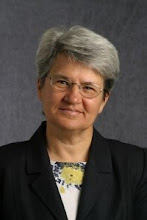
Last evening the Thames Valley Chamber of Commerce hosted a meeting at Vicars' Hall, Windsor Castle. While the evening's conversation focused on pursuit of business opportunities in India, my attention turned more toward having dinner at THE Castle.
There was so much to absorb - such as the motto of the English Order of the Garter posted on the wall. It read, "Honi soit qui mal y pense" which translated means "Let he who thinks ill there be shamed." This statement supposedly originated when King Edward III was dancing with Joan of Kent. Her garter slipped down to her ankle, causing those around her to snicker at her humiliation. In an act of chivalry Edward placed the garter around his own leg, saying "Honi soit qui mal y pense" and the phrase later became the motto of the Order.
The Vicars' Hall itself is simply stunning. It was constructed in 1415 as part of the lodgings and common dining room for the vicars and other junior members of St George's Chapel, Windsor Castle. Evidently, in the 1550s, after the Reformation, the building was turned into schoolmasters' lodgings and then, in the late 17th-century, into a library, a lecture room and concert hall.
The warmth of the fireplace, the grand piano, the historic paintings, the remarkable architecture, the endless shelves displaying an eclectic range of book titles and the most scrumptious dinner (goat cheese and watercress salad, vegetarian Wellington, root vegetable mash, green beans, pecan & chestnut pie, creme anglaise, and peach compote) must surely make residents of Windsor Castle feel like royalty. It surely had that affect on me having been granted the privilege of one evening in such environs.
Thanks, Your Majesty, for having shared such elegance with this humble American cousin.



